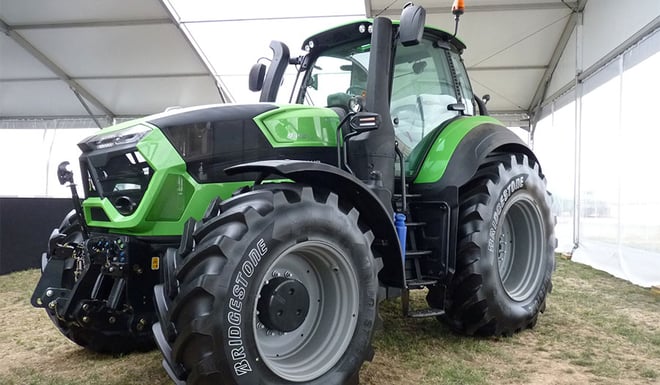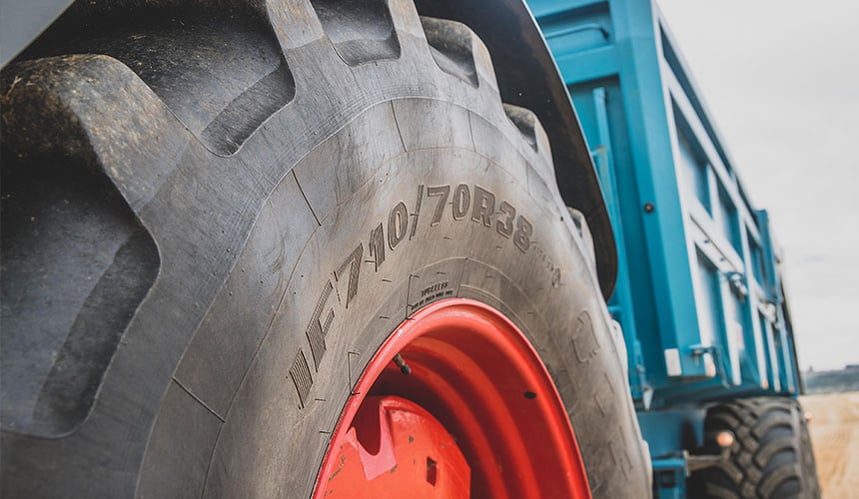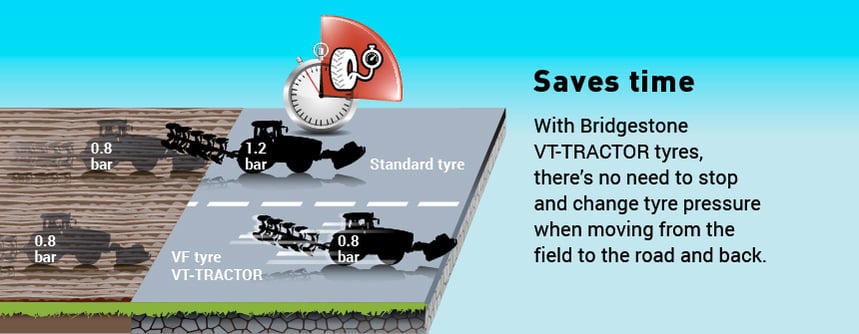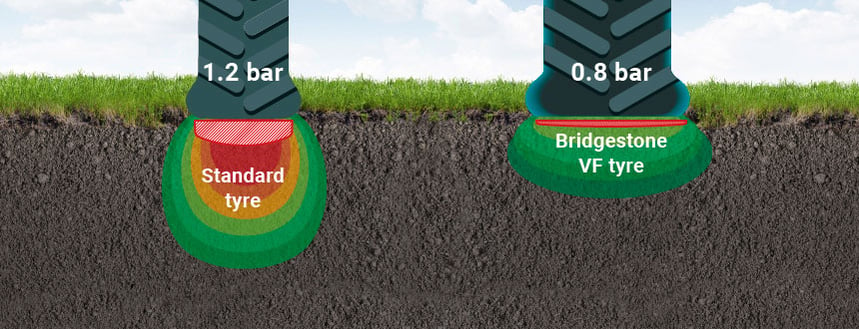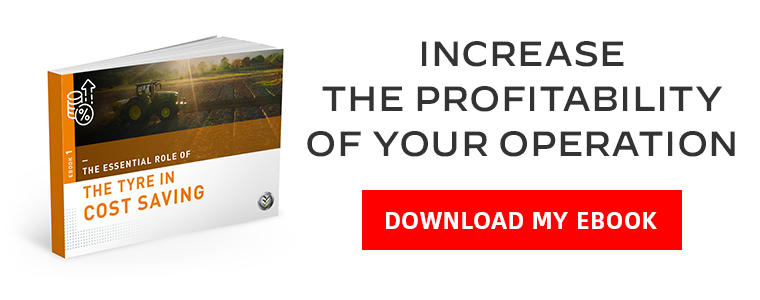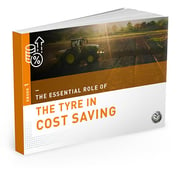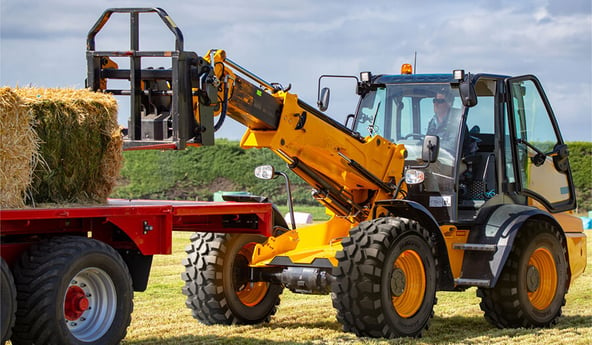The tyre is an essential part of your machine, which transmits engine power to the ground. When it comes to renewing your tyres, it’s always important to consider the choice of tyre technology. This choice depends on how you use your tractor, with it being crucial to distinguish between a tractor used for regular field crop operations in the fields and a tractor which is used in the farmyard or for transport.
For work on a hard surface in the farmyard, for handling operations, preference should be given to robust tyres that are used with a high inflation pressure. However, for use in the fields, this is where the difference lies, because you need to be able to work with large, heavy implements without overly damaging your soil, which would be counterproductive in the long term. In this case, the question of the choice of technology is crucial, because it can change everything in terms of speed of work, fuel savings and your ability to preserve your soil
In this article we look at the major differences you will find between three types of tyre: standard, IF or VF.
Bearing in mind that there are several types of agricultural tyre, it is best to choose the model that is best suited to the work you actually do, in order to carry out your operations in the best possible conditions, whether it be sowing, tilling, treatment of crops, feeding cattle or harvesting. Between the diagonal (bias ply) or radial structure tyres, between the standard or low-pressure IF or VF models, how do you know what’s best?
1. Choosing the right type of casing based on your tractor’s principal activity
Irrespective of the tyre technology, you need to choose the right structure for the casing. There are two different types:
- Older design diagonal structure tyres.
- More current radial structure tyres.
2. What are the pros and cons of diagonal tyres?
With its more rounded shape at the level of the tread, diagonal casing is made up of layers of diagonally crossed fabric (made of cotton to begin with, then nylon), hence the name.
This design makes the tread and the sidewalls completely interdependent, which increases the overall rigidity of the tyre.
The number of layers of crossed fibres effectively has to be increased to optimise the solidity of the tread. With this logic, the thickness is the same for the sidewalls. Due to this more simple design, a diagonal structure tyre tends to cost less than a radial tyre
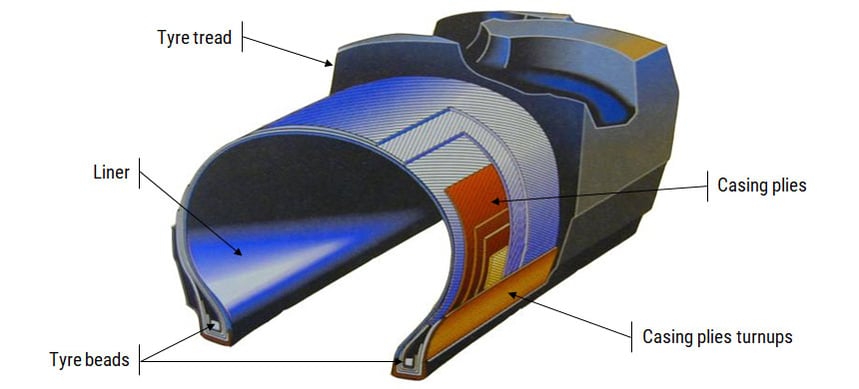 Cross section of a diagonal structure tyre
Cross section of a diagonal structure tyre
A diagonal structure tyre’s resistance depends on the number of overlapping layers of fabric. The more there are, the more solid the casing is, but it also becomes more rigid.
Due to this overall firmer structure of the sidewalls, this type of tyre lacks flexibility, road handling is harder, with less grip in the fields than a radial tyre, with most of the pressure concentrated around the central part of the tread, making it unsuitable for protecting your soil.
3. What is radial casing and why give preference to this tyre structure?
If your farm is principally dedicated to crop farming (wheat, barley, rapeseed, beet, corn, potatoes…) you should choose radial structure tyres, to preserve your soil and boost your traction capacity.
Identifiable due to its squared look, with a tread that is perfectly flat on the ground, radial casing is made up of layers of fabric (made of nylon or rayon) which are perpendicular to the centerline for the sidewalls, and independent from the fabric cords in the tread.
This structure results in a tyre with a reinforced tread and more supple sidewalls, which offer great flexibility.
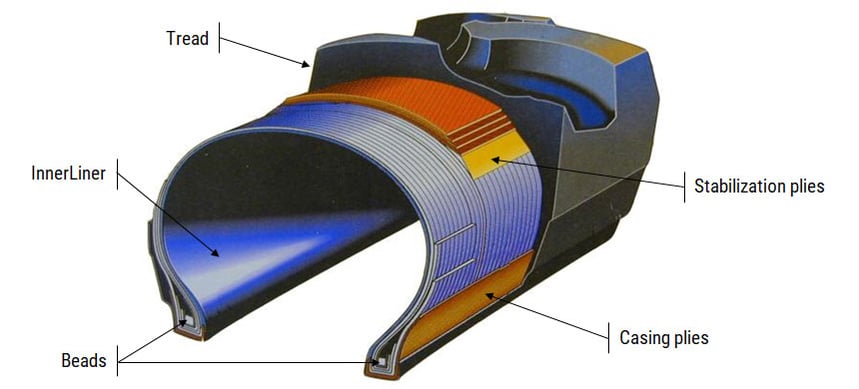 Cross section of a radial structure tyre
Cross section of a radial structure tyre
Its square shape has been carefully studied to enable even wear over the full width of the tread, thus ensuring better resistance against abrasion and a longer lifespan. Unlike the diagonal casing, the radial structure provides remarkable road handling and optimal driving comfort. It acts as an efficient shock absorber thanks to its sidewalls which change form easily to fit the shape of the ground.
4. Standard radial tyres are the most common
Standard radial tyres are currently the most commonly used in the agricultural sector to the detriment of diagonal structure tyres. The reasons for this choice are multiple:
- They are suitable for use in the fields due to their capacity to spread out the load to the ground,
- They are also adapted to transport by road.
- Additionally, they also have a highly robust tread and a longer life than standard diagonal structure tyres.
Due to their specific design, they tend to cost more than diagonal tyres, but they are excellent value for money because they are much more multi-purpose
Thanks to their flexible sidewalls which ensure that the pressure to the ground is spread out better, this type of agricultural tyre will wear more regularly and evenly than a diagonal structure tyre.
To work in good conditions and have a reasonable lifespan, standard tyres on the other hand require systematic pressure control in order to respect the tyre’s actual capacity.
The load must correspond to a limited speed and a precise inflation pressure. It is necessary to adapt pressure between the road and the fields in order to avoid soil compaction on your land and preserve the tyre against wear on the road.
The load capacity will be limited if you work with high torque or you wish to drive at speed.
5. Why choose an IF technology radial tyre rather than a standard radial tyre?
This category of tyre allows you to take advantage of equipment which really contributes towards optimising your productivity. IF (Improved Flexion) tyres are more efficient than standard models.
What is an IF tyre?
An agricultural IF (Improved Flexion) tyre has a reinforced casing with more resistant, but also more flexible sidewalls. One of the main benefits of these tyres is the possibility of reducing inflation pressure to 1 bar to preserve your soil, thanks to the supple, reinforced sidewalls, which is not possible with a standard agricultural tyre whose recommended inflation pressure is generally closer to 1.6 bar.
In the fields, this low pressure gives you an optimal slip ratio of between 10 and 15%.
Unlike standard tyres, the low inflation pressure allows you to increase the soil footprint so as to spread out the load better.
Regular time saving
When you use standard tyres, you are obliged to adjust pressure each time you go from one working area to another. By opting for an IF tyre, you save a great deal of time, because it is no longer necessary to change the pressure settings between the fields and the road.
This type of tyre has a flexible, resistant structure which allows you to keep the same inflation pressure, whatever your use of the tractor or the type of ground you are driving on.
20% more load than a standard tyre
Thanks to their flexible, more resistant structure, IF tyres give you a bonus load compared to the same size of standard tyre. They can carry up to 20% more load with the same pressure.
For example, here is a comparison between a 710/70 R42 IF tyre and a standard tyre of the same size:
- IF tyre: maximum load 4,890 kg with a pressure of 1 bar and a speed of 65 km/h,
- Standard tyre: maximum load 4,055 kg again at 1 bar and with a speed of 65 km/h,
i.e. a difference of 835 kg in favour of the IF tyre.
- IF tyre: maximum load 6,700 kg with a pressure of 1.6 bar and a speed of 65 km/h,
- Standard tyre: maximum load 5,620 kg again at 1.6 bar and with a speed of 65 km/h,
i.e. a difference of 1,080 kg in favour of the IF tyre.
6. Why chose a radial VF tyre such as the VT-TRACTOR?
VF technology tyres represent a real opportunity to improve your tractor’s capacities. This investment in high-end equipment will improve your productivity over several years.
What do we mean by a VF tyre?
A VF (Very Improved Flexion) agricultural tyre is designed with more refined materials than standard tyres, increasing resistance, flexibility, load capacity and traction.
It has a reinforced tread with very supple sidewalls, and is resistant to shocks and flexion. Depending on the reference, this type of tyre is approved for road use at a maximum speed of 70 km/h.
Up to 40% more load
Thanks to their reinforced structure, VF technology tyres can bear up to 40% more load, at the same inflation pressure, than standard tyres of the same size. A real advantage for working with large implements which allows you to improve productivity or reduce the number of trips back and forth with trailers during harvesting.
For example, here is a further comparison between a VF 710/70 R42 tyre and a standard tyre of the same size:
- VF tyre: maximum load 5,600 kg with a pressure of 1 bar and a speed of 65 km/h,
- Standard tyre: maximum load 4,055 kg, again at 1 bar and with a speed of 65 km/h,
i.e. a difference of 1,545 kg in favour of the VF tyre.
- VF tyre: maximum load 7,750 kg with a pressure of 1.6 bar and a speed of 65 km/h,
- Standard tyre: maximum load 5,620 kg, again with a pressure of 1.6 bar and a speed of 65 km/h,
i.e. a difference of 2,130 kg in favour of the VF tyre.
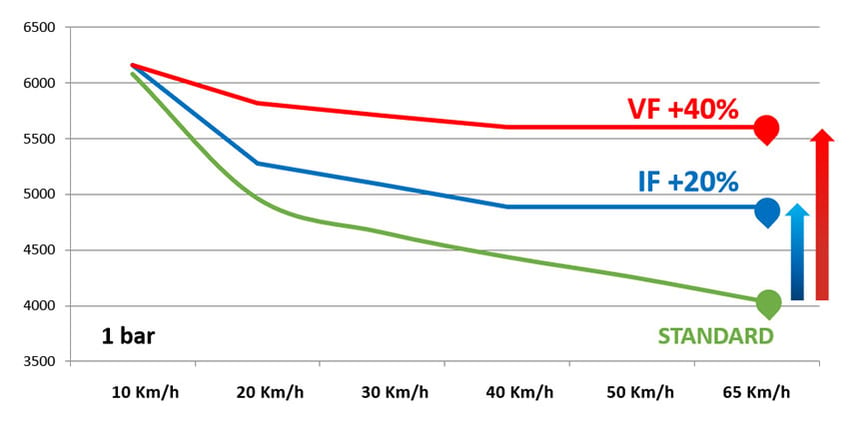 Comparison of the load capacities of standard, IF and VF tyres
Comparison of the load capacities of standard, IF and VF tyres
for each speed, with a pressure of 1 bar
Daily time saving
VF technology means that you no longer have to adjust pressure each time you go from one type of ground to another, allowing you to keep the same pressure on the road and in the fields. In addition, you are no longer limited by a reduced speed when loaded. Periods of transport by road can go ahead at speed in complete safety.
A considerable amount of time is saved by the end of the day when you don’t have to change inflation pressure and you can drive faster on the road.
Better soil preservation
These are low-pressure tyres which can work continually at 0.8 bar. They have a large soil footprint thanks to the sidewall design, which reduces the risks of slip and compaction considerably.
The reduction in soil compaction helps you preserve your crops and increase long-term productivity on your land.
Better traction for optimal profitability
VF tyres such as the VT-TRACTOR tyre are the outcome of many hours of research and development which have led to optimisation of the lugs with a more advanced design, with optimal size, angle and thickness to obtain excellent soil penetration.
Combined with the width and length of the footprint, the tyre has more lugs gripping into the ground at the same time, which increases the traction capacity substantially while reducing slip. The VF VT-TRACTOR tyre also has a carefully developed structure with the aim of ensuring maximum self-cleaning capacity on all types of land, even on heavy soil.
The Bridgestone-agriculture.eu blog is written and administered by tractor tyre experts who are available to provide you with the advice you need on the subject of your agricultural tyres. They allow you to maximise your productivity with information on all subjects linked to tyres: Technical data for agricultural tyres – Agricultural tyre performance – Air pressure advice, Solutions to avoid soil compaction – Sprayer tyre pressure – Why and how to ballast your tractor tyres – etc.
To take it one step further and increase the profitability of your farm, les Experts du pneu provide a free, highly detailed eBook which explains the essential role of the agricultural tyre in your productivity.
Most people who read this article have also read some of the following articles which are listed by order of popularity:
- Buying guide: 10 important tips for choosing the right farming tyres
- Full explanations on the manufacture of agricultural tyres
- Harvesting campaign: how to obtain a better bonus load?
- What materials guarantee the quality of your tractor tyres
- Which agricultural tyre configuration is suited to each use
- The best agricultural tyres for agricultural contracting companies
- How do my tractor tyres impact my vineyards?
- Agricultural contracting companies: why to invest in a tire inflation system
- Technologies that make the difference for quality agricultural tyres
- Changing agricultural tyre series: how does it work?
This information is intended only to make you aware of the technical and functional aspects of agricultural tires and their use. It does not allow you to make a judgment or a definitive conclusion on a given problem. Only your agricultural tire expert is able to make a technical assessment and take a final decision, case by case.
Leave a
commentary
Your email address will not be published.
Required fields are indicated with *


